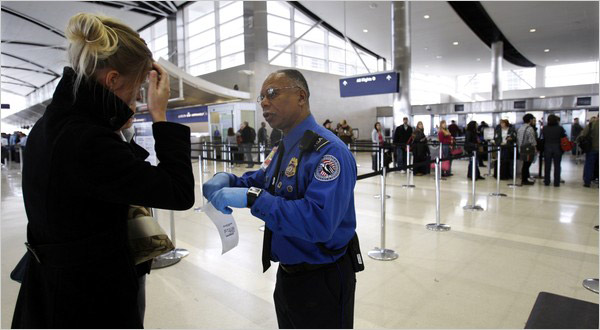
|  |  |  Travel & Outdoors | December 2009 Travel & Outdoors | December 2009  
New Restrictions Quickly Added for Air Passengers
 Micheline Maynard & Liz Robbins - New York Times Micheline Maynard & Liz Robbins - New York Times
go to original
December 27, 2009


| | Paul Marshall, a Transportation Security Administration agent, helping an international traveler at the Detroit airport on Saturday. Heightened screening was in effect at airports worldwide. (Carlos Osorio/Associated Press) |  |
In the wake of the terrorism attempt Friday on a Northwest Airlines flight, federal officials on Saturday imposed new restrictions on travelers that could lengthen lines at airports and limit the ability of international passengers to move about an airplane.

The government was vague about the steps it was taking, saying that it wanted the security experience to be “unpredictable” and that passengers would not find the same measures at every airport — a prospect that may upset airlines and travelers alike.

But several airlines released detailed information about the restrictions, saying that passengers on international flights coming to the United States will apparently have to remain in their seats for the last hour of a flight without any personal items on their laps. It was not clear how often the rule would affect domestic flights.

Overseas passengers will be restricted to only one carry-on item, and domestic passengers will probably face longer security lines. That was already the case in some airports Saturday, in the United States and overseas.

The restrictions will again change the routine of air travel, which has undergone an upheaval since the terrorist attacks in New York and Washington in September 2001 and three later attempts at air terrorism.

Soon after the attempt on Friday, travelers at airports around the world began experiencing heightened screening in security lines. On one flight, from Newark Liberty International Airport to Little Rock, Ark., flight attendants kept cabin lights on for the entire trip instead of dimming them for takeoff and landing.

The limits, which brought to mind some of the most stringent policies after the 2001 attacks, come at a difficult time for the airline industry.

Travel has declined about 20 percent since 2008 because of the economy, and airlines have been dealing with numerous delays in the past week because of snowstorms on the East Coast and in the Midwest.

Airline industry executives said the new steps would complicate travel as vacationers return home from holiday trips and could also cause travelers to cancel plans for flights in 2010.

But the government seemed to discount those concerns. The homeland security secretary, Janet Napolitano, said in a statement Saturday that new measures were “designed to be unpredictable, so passengers should not expect to see the same thing everywhere.” She said passengers should proceed with their holiday plans and “as always, be observant and aware of their surroundings and report any suspicious behavior or activity to law enforcement officials.”

The Transportation Security Administration, which governs security at airports and on airplanes in the United States, had no immediate comment on the steps. There also was no statement from the Air Transport Association, the trade group for American carriers.

Two foreign airlines, Air Canada and British Airways, disclosed the steps in notices on their Web sites. The airlines said the rules had been implemented by government security agencies including the T.S.A.

“Among other things,” the statement on Air Canada’s Web site read, “during the final hour of flight customers must remain seated, will not be allowed to access carry-on baggage, or have personal belongings or other items on their laps.”

The suspect in the Friday attempt, identified as Umar Farouk Abdulmutallab, 23, tried to ignite his incendiary device in the final hour of the flight while the plane was descending into Detroit.

On its Web site, American Airlines said the T.S.A. had ordered new measures for flights departing from foreign locations to the United States, including mandatory screening of all passengers at airport gates during the boarding process. All carry-on items would be screened at security checkpoints and again at boarding, the airline said. It urged passengers to leave extra time for screening and boarding.

In effect, the restrictions mean that passengers on flights of 90 minutes or less would most likely not be able to leave their seats at all, since airlines do not allow passengers to walk around the cabin while a plane is climbing to its cruising altitude.

The new restrictions began to be instituted Saturday on flights from Canada and Europe to the United States. Air Canada said it was waiving fees for the first checked bag, and it told passengers to be prepared for delays, cancellations and missed connections because of the new limits.

At airports Saturday, travelers recounted the immediate differences they experienced. Though passengers arriving from Frankfurt passed speedily through customs at Kennedy Airport in New York, they said that in Germany the security was intensified.

“I really was surprised,” one passenger, Eva Clesle, said about the level of scrutiny in Frankfurt, adding that officials had inspected backpacks by opening “every single zip.”

In Rochester, N.Y., a passenger waiting in a security line said she had seen other passengers removed for additional screening.

Many of Air Canada’s flights in and out of La Guardia Airport in New York were canceled or delayed, and ticket agents blamed new security screenings.

Sarah Maslin Nir in New York contributed reporting. |

 |
|  |



